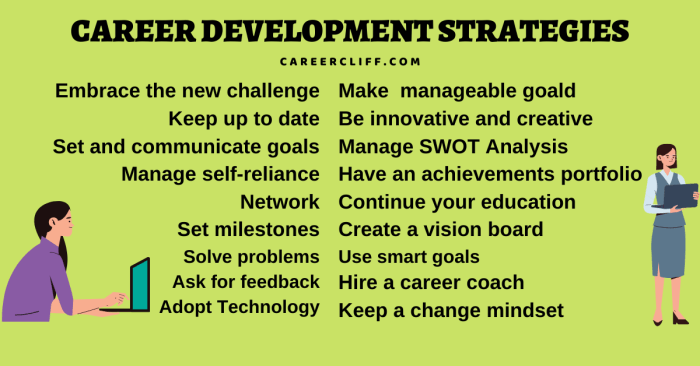Kicking off with Career Growth Strategies, this opening paragraph is designed to captivate and engage the readers, setting the tone american high school hip style that unfolds with each word.
When it comes to carving out a successful career path, having effective strategies in place is key. Whether it’s upskilling, networking, or setting SMART goals, knowing how to navigate your professional journey can make all the difference. Let’s dive into the world of Career Growth Strategies and unlock the secrets to reaching new heights in your career.
Importance of Career Growth Strategies
In today’s competitive job market, having effective career growth strategies is crucial for professional development. These strategies help individuals set clear goals, identify opportunities for advancement, and take proactive steps to achieve success in their careers.
Increased Job Satisfaction and Performance
- By setting specific career goals and creating a roadmap to achieve them, individuals can stay motivated and focused, leading to increased job satisfaction.
- Employees who actively work on their professional growth are more likely to perform better in their current roles, leading to recognition and opportunities for advancement.
Enhanced Skills and Knowledge
- Investing time and effort into developing career growth strategies allows individuals to continuously improve their skills and expand their knowledge base.
- By seeking out learning opportunities and professional development experiences, individuals can stay relevant in their fields and adapt to changes in the industry.
Career Advancement Opportunities
- Effective career growth strategies help individuals position themselves for promotions, salary increases, and new job opportunities.
- By showcasing their skills, accomplishments, and potential, individuals can stand out to employers and advance their careers more quickly.
Types of Career Growth Strategies

In today’s competitive job market, it is essential to have a plan in place to advance your career. There are various types of career growth strategies that individuals can utilize to achieve their professional goals. Let’s explore some of the most common strategies and how they can contribute to your career progression.
1. Upskilling
Upskilling refers to acquiring new skills or enhancing existing ones to stay relevant in your field. This can involve taking courses, attending workshops, or obtaining certifications. By upskilling, you can increase your value as an employee and open up new opportunities for career advancement.
2. Networking
Networking is another crucial strategy for career growth. Building and maintaining professional relationships can help you stay informed about industry trends, job openings, and potential mentorship opportunities. Networking can also lead to referrals and recommendations, which can be invaluable in advancing your career.
3. Mentorship
Having a mentor can provide you with guidance, support, and valuable insights into your chosen field. A mentor can help you navigate challenges, set goals, and make strategic decisions that can positively impact your career trajectory. Establishing a mentor-mentee relationship can be a powerful tool for professional development.
Setting Career Goals

Setting clear and achievable career goals is crucial for professional growth. It provides a roadmap for your career journey, helps you stay focused, motivated, and ensures you are moving in the right direction. Here are some tips on how to set SMART career goals:
Tips for Setting SMART Career Goals
- Specific: Clearly define what you want to achieve in your career. Avoid vague goals like “be successful.”
- Measurable: Set goals that can be measured so you can track your progress. For example, “increase sales by 20%.”
- Achievable: Make sure your goals are realistic and within reach. Setting impossible goals can lead to frustration.
- Relevant: Align your career goals with your long-term aspirations and the direction you want your career to take.
- Time-bound: Set a deadline for achieving your goals. This helps create a sense of urgency and accountability.
Goal-setting plays a crucial role in aligning career growth strategies with personal aspirations. By setting clear and SMART goals, you can ensure that your efforts are focused on what truly matters to you and are in line with your overall career vision.
Overcoming Career Plateaus: Career Growth Strategies
When individuals reach a career plateau, they often face common challenges that can hinder their professional growth and development. These challenges may include feeling stagnant, unfulfilled, or lacking motivation to advance further in their careers.
Recognizing Signs of a Career Plateau
It is essential to recognize the signs of a career plateau to take proactive steps towards overcoming it. Some common signs include:
- Feeling unchallenged or bored with your current role
- Lack of opportunities for advancement or skill development
- Decreased motivation and passion for your work
Strategies for Overcoming Career Plateaus
Here are some effective strategies to overcome career plateaus and reignite your professional growth:
- Seek new challenges and opportunities within your current role
- Develop new skills or pursue further education to expand your knowledge and expertise
- Network with professionals in your industry to explore new career paths
- Set clear and achievable career goals to stay motivated and focused
- Consider a lateral move or a career change to break out of the plateau
Real-Life Examples of Success, Career Growth Strategies
One real-life example of an individual successfully navigating a career plateau is Sarah, a marketing manager who felt stuck in her role. To overcome this plateau, Sarah decided to enroll in a digital marketing certification program to enhance her skills. This additional qualification opened up new opportunities for her within the company, eventually leading to a promotion to a senior marketing position.


